Technoland
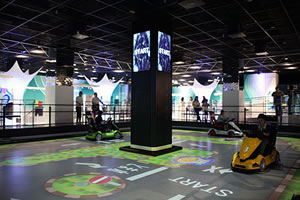
Technoland is an interactive playground where you can experience and learn the principles and mechanisms used in textile machinery, automobiles, and more, all while enjoying a gaming-like atmosphere.
*We appreciate your understanding that we have implemented the following restrictions to ensure safe operations.
・Admission is by time slots, and each person may only enter once per day.
(Time slots and maximum number of entrants may change due to unforeseen circumstances)
・To enter technoland, adding to an admission ticket a numbered ticket is required. The numbered ticket is distributed at the numbered ticket counter on the day on a first-come, first-served basis. (Reservations via the internet or phone are not available).
・Parental supervision is mandatory for all preschoolers inside the facility.
・Some attractions have height and age restrictions.
Converting Mechanisms
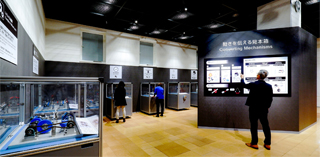
For a machine to work, it needs mechanical elements such as gears, cams, and links to transmit and convert power. You can observe and learn with reality by moving them with your hands.
Face the Wind
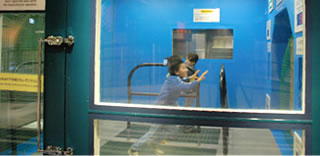
You feel the force of air flow whenever you stand in the wind or run. The force that offsets the airflow and prevents you from being blown away is called air resistance. This specially constructed wind tunnel allows you to experience the wind speed, and the relationship between the shape of objects and air resistance.
The wind speed and air resistance are displayed on the wall, and visitors can see the changes in resistance as they change their posture such as standing, squatting, and extending arms. Feel the changes in resistance as you change your posture.
(All preschoolers must be accompanied by a guardian when entering the facility.)
Techno Circuit
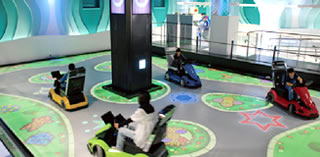
You can experience the basic automobile operation of running, turning, and stopping by driving a toy car on the course displayed on the floor panel.
(For children taller than 120 cm)
Hand Brake
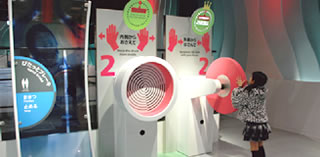
Automobile brakes stop the wheel in motion using friction to reduce kinetic energy. Common brake structures include drum and disk brakes. The differences between these two brake systems are explained here. Visitors can press their hands against the rotating unit and feel the heat generated from the friction.
Rhythmic Pistons
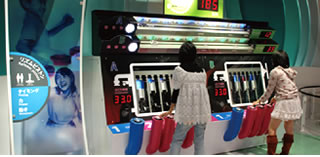
In a gasoline fueled engine, fuel and air are mixed, compressed, and ignited to create an explosion that converts combustion energy into continuous cycle of rotary motion. In order to produce this explosion continuously and efficiently, ignition timing is very important.
Visitors will compete for the level of acceleration by aiming for the most appropriate ignition according to the engine rotation.
Trans MISSION
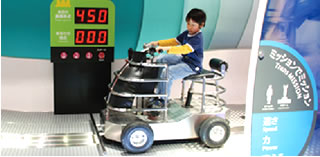
At Trans MISSION, children can realize the need of transmission because adjusting speed is difficult without selecting appropriate gears for low speed or high speed.
(For children taller than 120 cm)
Make a Frost-Covered Tree
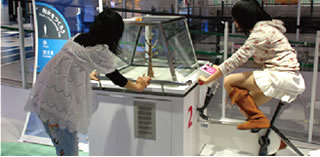
If the humidity is low on a midsummer’s day, you feel cold when you come out of the water after a swim, even though the temperature is high. This happens because in the process of evaporating, water droplets draw heat from your body. Air conditioners and refrigerators make use of this same principle.
(For children taller than 120 cm)
Virtual Weaving Machine
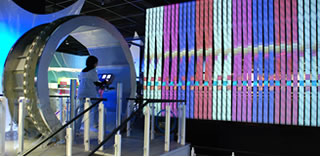
You step in the big wheel then the virtual fabric is weaved. The three elements of fabric weaving, namely, opening, weft insertion, and beating, are repeated, and this process is displayed on a large screen. Choose your favorite colored thread and weave colorful fabric.
(Up to two people can experience it simultaneously. All preschoolers must be accompanied by a guardian.)
Weave a Color Wall
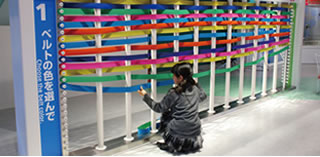
You can learn about the basic principle of the weaving with the weft crossing over and under the warp to create a crisscross pattern.
Pattern Weaving Bench
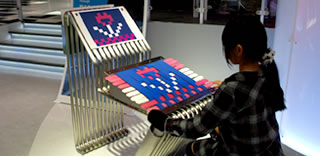
Weaving is the crisscrossing of warp and weft at right angles. The orderly over passing of the weft to the warp produce the pattern of the fabric. There are three-types of weaving such as, plain, twill and satin. At this weaving table, visitors can try different types of weaving by considering how to use the weft and also try making patterned fabric.
Water Jet Threader
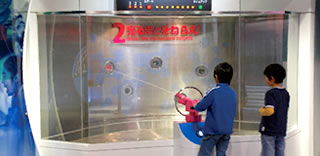
One of the weaving machines is a Water Jet Loom powered by high pressure water jet. This principle is used in the game to hit the mark with the water. Players can feel the power of water under high pressure.
Air Jet Relay
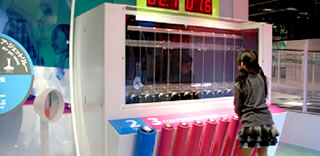
Another weaving machine is the Air Jet Loom powered by high pressure air jet. This principle is used in a game to move a ball instead of thread. Players can feel the power of air under high pressure.

